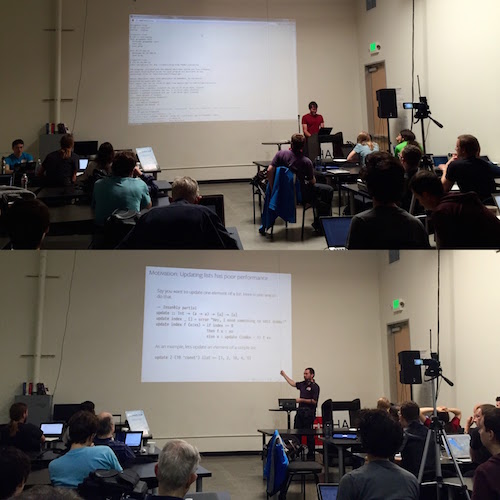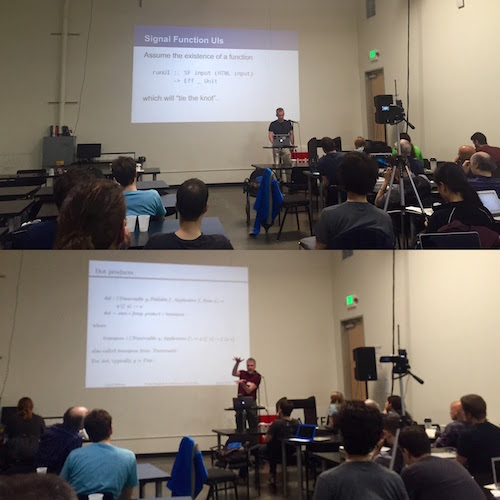Bayhac 2015
June 30, 2015 | Joe Nelson
Bayhac is back. The annual Bay Area Haskell conference and hackathon met last weekend for its fifth consecutive year, bringing us fascinating talks and strongly-typed bonhomie. It drew attendees from all over the country, even from faraway Oakland (I’m told to say, “Go Warriors!”).
Each year at Bayhac I am reminded how the Haskell community is thriving: more adoption, new libraries, robust tooling. It seems that the language is destined to fail at its goal of “avoiding success at all costs.” What struck me this year is the number of funded startups developing critical parts of their products in Haskell. They are springing up in San Francisco, some blocks away from the Wagon office, companies like Mirror, Front Row Education, Projector, IMVU, Alpha Heavy Industries, and Pingwell.


The conference started out strong with two talks which interested me personally. Tikhon Jelvis demonstrated how lazy evaluation is fundamental to designing modular code, not just an incidental curiosity. He gave numerous examples of laziness solving problems (the video for his talk is available here).
Then Dan Burton took the
stage and gave us a tantalizing vision of the world post cabal-install,
a glimpse of Stack.
It is the spiritual successor of stackage-cli. In addition to
locking project dependencies at mutually compatible versions like
its predecessor, Stack can install necessary binaries and fetch
packages right from git. Building projects, arguably the biggest
pain in Haskelland, is getting better.
That was just Friday night. The rest of the weekend had plenty in store including our very own Mike Craig sharing Wagon’s experience of using Haskell. This technology choice has served our small team well and his talk dives in to its strengths and weaknesses. The presentation showcases our product space, technical architecture, the libraries we lean on, and our deployment strategy. He also discusses Haskell’s learning curve (pros and cons) as well as its positive impact on recruiting. It’s one of the core reasons we’re able to frequently ship new features with confidence.
If a picture is worth a thousand words then a thirty minute video at thirty frames per second is worth fifty-four million words. Here they are:
Big thanks to Bayhac organizers, notably Maxwell Swadling who stepped up to bring everyone together, handling everything from food to soliciting talks to the conference web presence. We’re looking forward to next year’s conference. In the meantime, keep a look out Wagon and community hosted Haskell events, or better yet, join our team!